About
ACU is a political-cultural center in the Voorstraat, directly in the center of Utrecht. ACU is non-commercial, independent from the municipality’s agenda, and fully run by volunteers. ACU has found its niche as it is for more than 40 years integral to Utrecht’s cultural and political scene.
ACU hosts various activities: café, vegan restaurant, DIY concerts, disco nights, political events, punk and hardcore gigs, jam sessions, benefit events, parties, movies, a library, and a meeting place for political and cultural initiatives.
House rules
We want ACU to be a nice and as safe as possible place where people can enjoy themselves. To achieve this we have some house rules. We hope you enjoy your time with us!
No harassment
We have a zero-tolerance policy against racism, sexism, ableism, homophobia, transphobia or any other form of psychological or physical oppression, discrimination, exclusion, violence or harassment. If you violate this policy, you will be asked to leave and risk a bar ban.
No drugs
We have zero tolerance for hard drugs. If you are spotted using hard drugs, you will be asked to leave and risk a bar ban.
99% Vegan
Please do not bring meat or fish into ACU.
No smoking
Ever since 2019 it’s not allowed to smoke inside ACU.
No pets
Pets like dogs have sensitive ears, so when ACU is busy and the music is loud, this is not the best place for them. It is impossible for us to provide a safe and comfortable environment for any animal.
No photography
Please don’t take photos or videos of people unless everybody in the frame has explicitly agreed to have their image taken. A night is more fun without phones anyway.
Be quiet outside
We try to maintain a good relation with our neighbors and keep disturbance as minimal as possible. We also risk a fine if people take their cups or bottles outside, so this is not allowed.
Cash preferred
ACU has a form of electronic payment in the bar. But we prefer using cash!
Follow instructions from staff
All ACU staff are working on a voluntary basis to keep you and other guests happy and safe. It is not likely at all that you will be asked to follow any instructions, but if it happens, we expect you to cooperate.
If you have been harassed or feel that you are a victim of discrimination or were mistreated by a guest or a volunteer, please let us know by filling in this form, or ask a volunteer present for assistance.
Our story
ACU has a long history. It all started way back before it was a squat, before it was a garage, even before Pierre-Joseph Proudhon invented Anarchism!
But who want’s a boring long lecture? Exactly... That’s why, instead, we created a timeline, so you can fly over our history in no time. Who knows, maybe you’ll learn something you didn’t know yet?
-
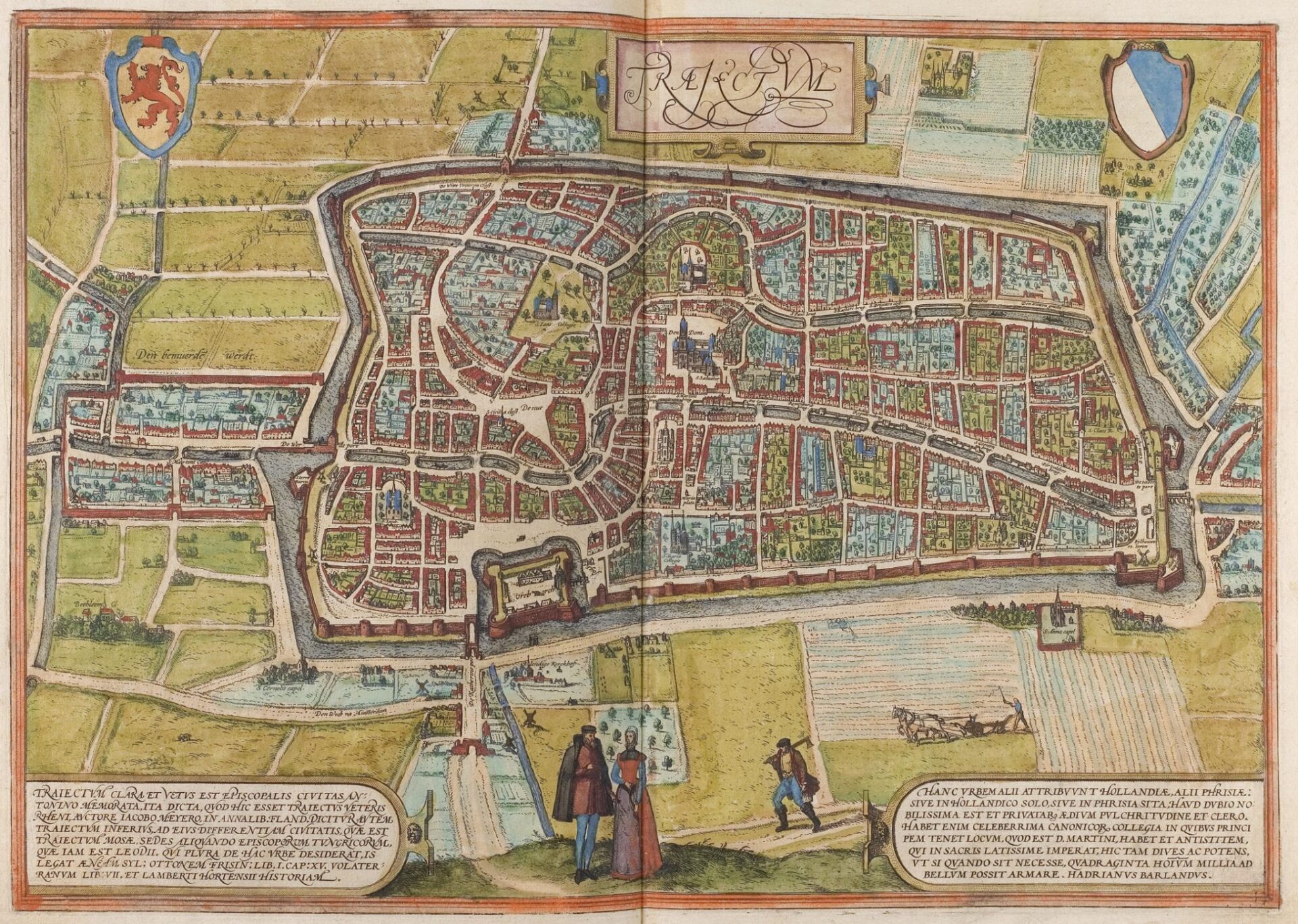
Old map of Utrecht
Medieval times
In medieval times, the terrain that ACU was built on was part of a garden that belonged to the Janskerk.
This garden eventually grew into a park. The building that is now ACU (or at least part thereof) has served as the municipal horse stables (“manege”), “spreeklokaal,” and school museum, respectively.
-
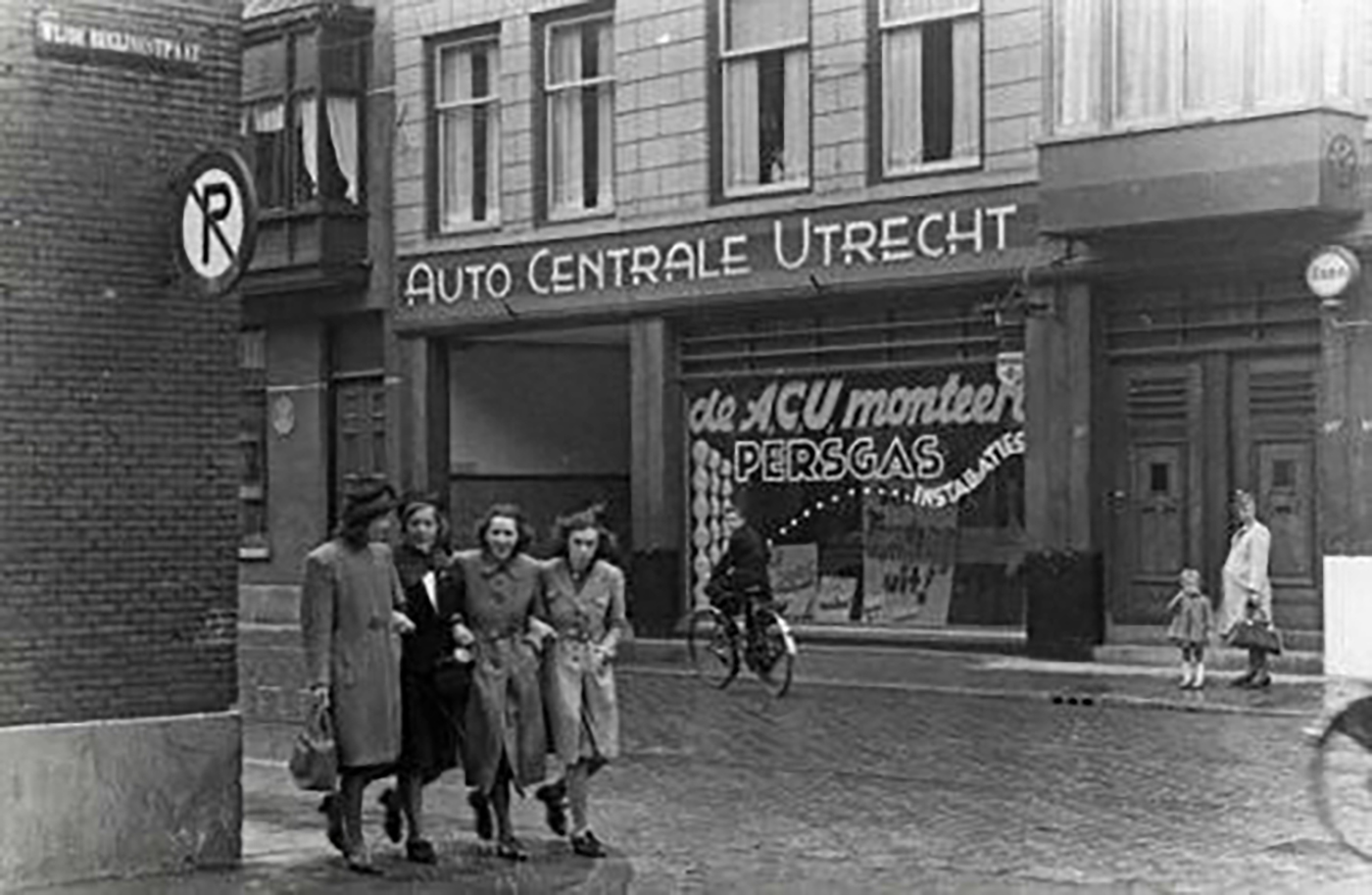
ACU in 1943
1920 – 1967
In the 1920’s, a car mechanics shop was established in the premises at Voorstraat 71 and 73. In 1929, this shop was further expanded and a significant part of the land between Janskerkhof and the Voorstraat was built on.
In 1935, the car company was taken over by the Maas family who renamed it Auto Centrale Utrecht, or in short: ACU. In 1949, Bob Maas took over the garage from his father. Several buildings were demolished to create space for an extended gas station right next to the building.
The company kept running until the sixties, after which the building was left empty for an extended period.
According to the records at the Chamber of Commerce, the garage was officially shut down in 1967.
-
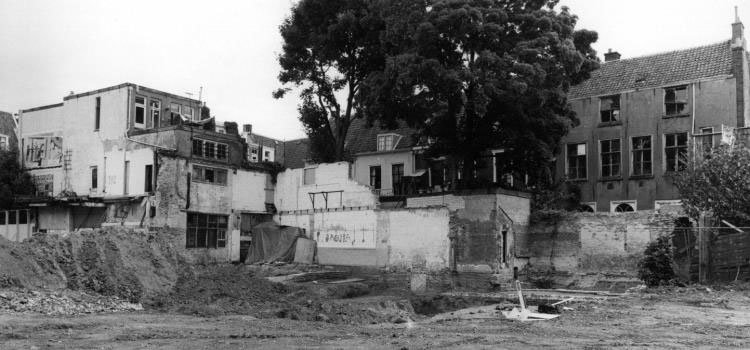
The ‘hole’ in the Voorstraat, 1972
1976 – 1979
During the night of March 26-27, 1976, the buildings at Voorstraat 69, 71 and 73 were squatted.
It took months of cleaning to make the upper levels suitable for habitation. Two years later, the showroom part of the garage on the ground floor was turned into a bar and exhibition space.
There was also a film house, named ACU, which started operating in 1979. Every Thursday, Friday, and Saturday night this film house screened films that weren’t shown in other places in the city.
-
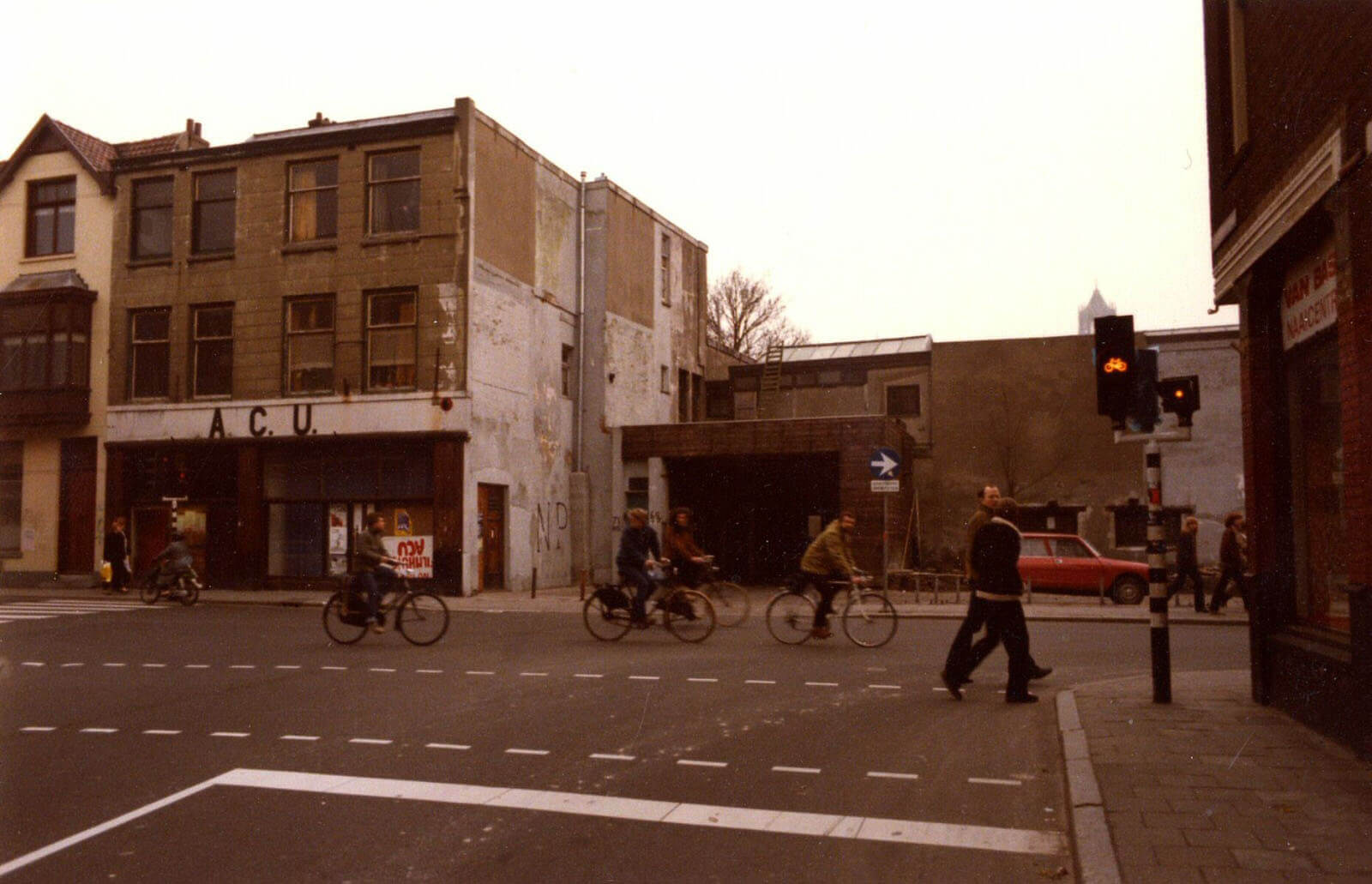
ACU and the ‘hole’ in the early 1980’s
1980’s – Part 1
Attempts to obtain municipal subsidy failed and there was a continuous shortage of money. For some volunteers this financial situation and the low visitor numbers were reason to leave the collective.
In the summer of 1983, the remaining film house volunteers decided to stop as well. In the meanwhile, at the end of 1982 the people who ran the squatters café ‘de Koffiekeet’, located at the Nobeldwarsstraat, asked if they could use ACU because they needed a new space.
After renovations of ACU’s bar space, the Koffiekeet became the main user of the ACU, starting on Tuesdays.
Soon, in 1983, the squat bar ACU opened its doors as well, and in the years that followed the activities were expanded to include gigs, dance nights, information meetings, the food co-op, squatting consultancy, jam sessions, and the legendary Thursday night bar.
-
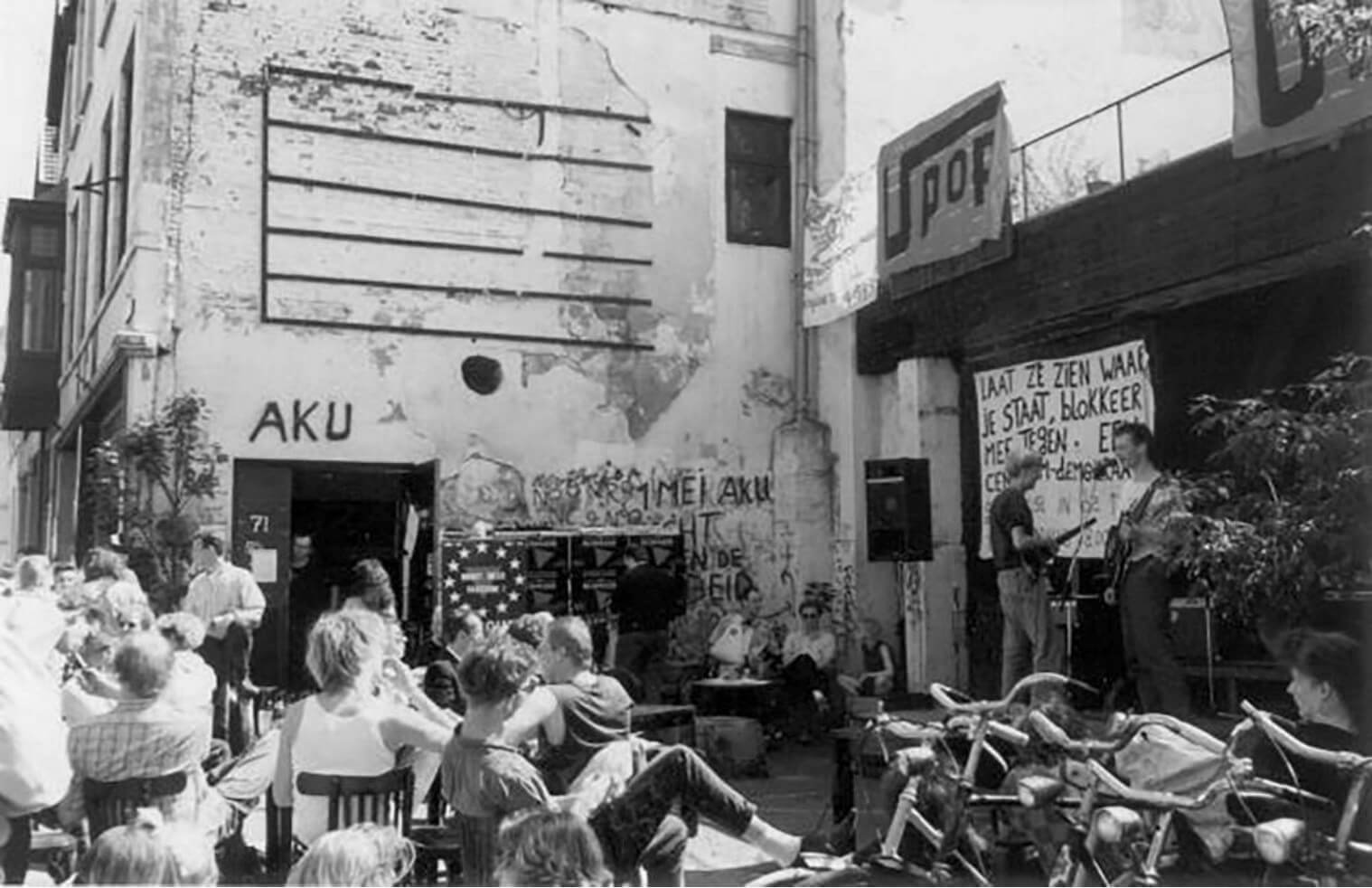
A meeting next to ACU, sometime in the 1980’s
1980’s – Part 2
Utrecht was becoming a car city. In 1981 the municipality of Utrecht, together with the Hollandse Beton Groep, presented a plan to build a parking garage with a capacity of 375 cars that would also include shops, and above the shops, living units for students and single-person families
In response, users of the ACU building founded the Vereniging Gat Voorstraat, which asked an architect to draft a sketch for a Centraal Wonen (collective housing) project.
The housing association K’77 got interested and ordered a feasibility check for living in Gat Voorstraat. The municipal service ROVU carried out research and concluded that a collective housing project would be feasible.
In 1983, however, a small majority of the Utrecht city council voted in favor to after all build a parking garage in Gat Voorstraat.
-
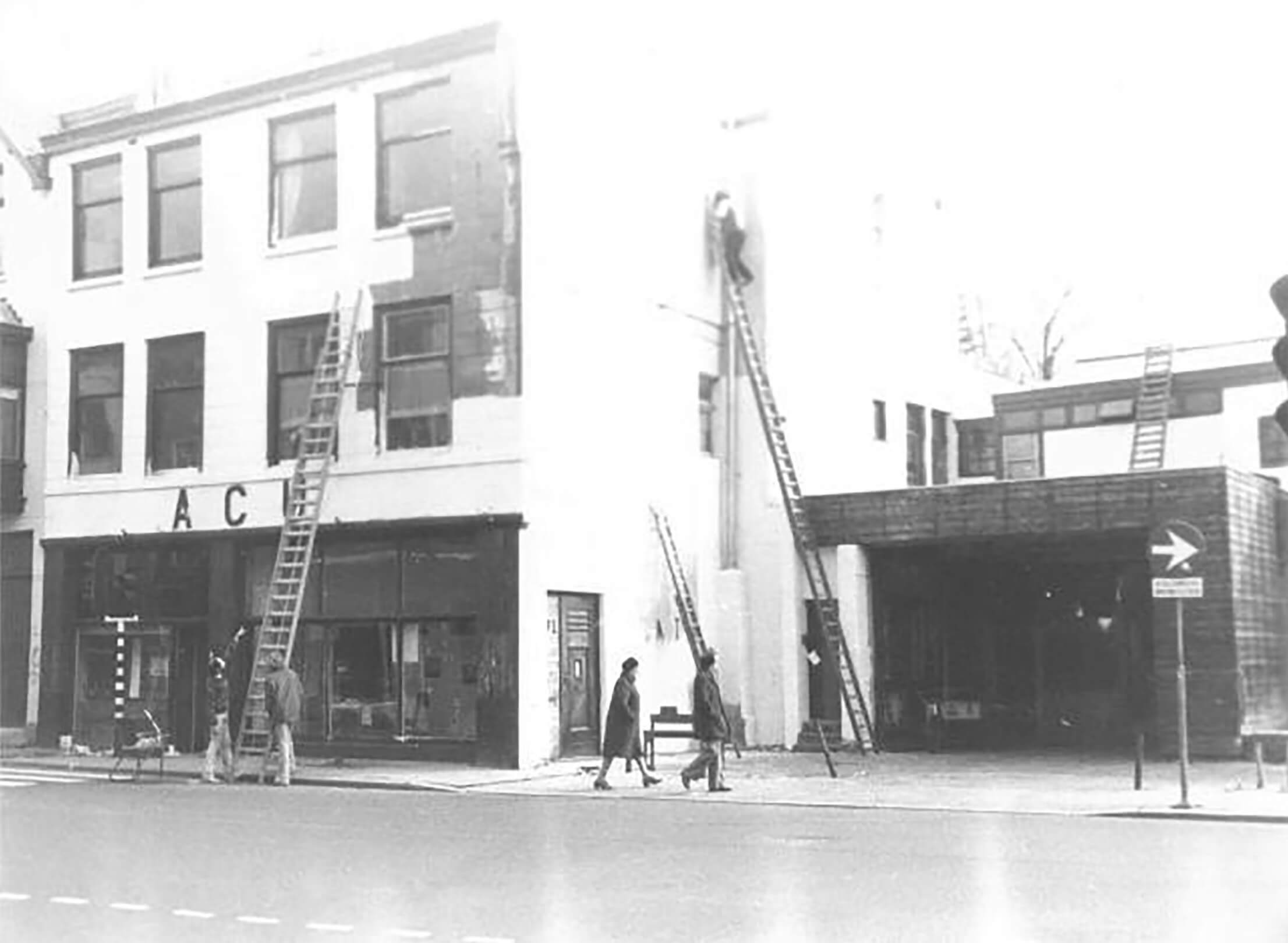
Renovations in the late 1980’s
1980’s – Part 3
In the meanwhile things were changing in the Voorstraat. Other parts of the terrain were squatted as well: Boothstraat 4 bis A and Voorstraat 69. A part of the garage was shut down and a few workspaces were created.
There was a wood shop, a car workshop, a stone mason shop, and art spaces. A number of people succeeded in starting up their own small business that allowed them to make a living.
In 1985 the Kraakcafé changed its name into ACU and more and more started to organize concerts and disco nights on Friday nights. ACU has always been open to new unknown bands and as such has obtained an important place in the Utrecht scene.
There were large parties, which always packed the place: New Year’s Eve, Queen’s Day, the 10-years-squatted anniversary, the 10-year bar anniversary, and so on.
On a regular basis there were also special events on a range of topics, about Kurdistan, the struggle of the Mexican Zapatistas, etc. And often there were benefit concerts for a range of causes.
-
Documentary about the ‘hole’ in the Voorstraat (in Dutch), 1989
1990’s – Part 1
As far as the terrain next to ACU, better known as the Gat Voorstraat,was concerned, since April 1991 people also lived on what was then still an illegal parking lot.
A few days before Queen’s Day this empty terrain was squatted, after years of hindrance from parked cars, cars that got broken into, violence, and theft.
The cars were removed and a fence was built. A big cleaning action was needed to prepare the terrain for living.
For several years a number of city nomads have been able to live here in their trailers, amidst the trees and the vegetation, right in the city center of Utrecht.
-
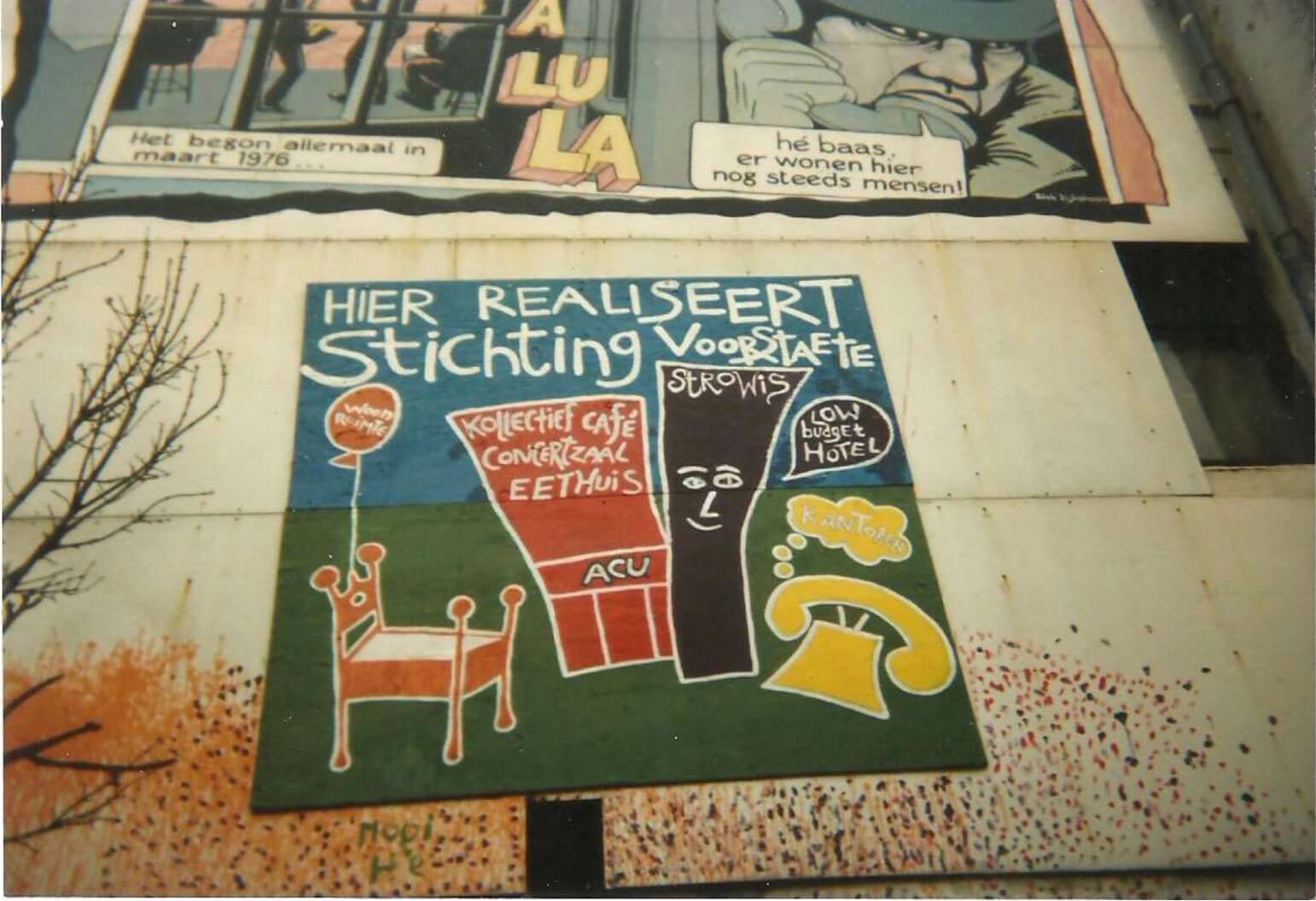
Advertisement for the project development by Stiching Voorstaete
1990’s – Part 2
Things remained unstable. In all those years there were regular negotiations between the municipality and the owner of the terrain, Bob Maas, but time and again to no avail.
Maas wanted to build a parking garage, but the municipality didn’t support this plan, because they wanted to exploit a parking garage themselves.
In 1990, the municipality announced that they wanted to expropriate the terrain. The problem, however, was that there wasn’t yet a ratified urban development plan for this area.
In December 1993, a first plan was created. In this plan it was assumed that there would be parking spaces in this area. In the meanwhile, however, the traffic situation in the city center was changing drastically and the municipality had to make sure the center wouldn’t get clogged with cars.
The new plan therefore no longer included a parking garage or parking spaces in the Gat Voorstraat.
-
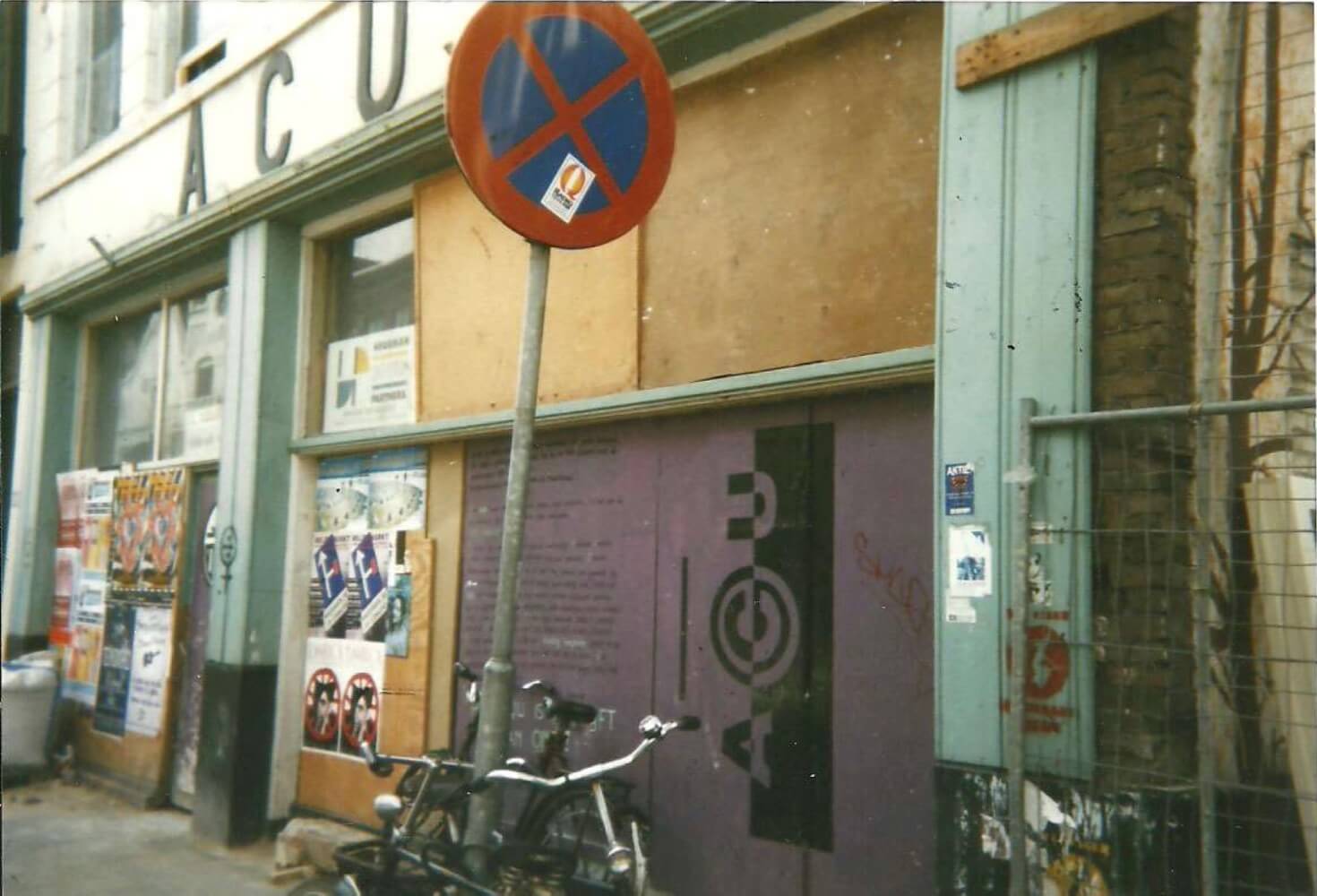
ACU before the big renovations of the late 1990’s
1990’s – Part 3
Following the municipal elections of March 1994, Utrecht had a coalition consisting of the PvdA (labor party), Groen Links, D66 (liberal democrats), and CDA (Christian democrats). This coalition amended the development plan to the current political situation; no more parking in the Voorstraat and more vegetation.
Towards the end of 1993, it became apparent that the ACU could not remain squatted forever as the Maas family intended to sell the premises. The users and inhabitants decided to look into the options for purchasing and legalizing the buildings and they created the Stichting Voorstaete (Voorstaete Foundation).
In May 1994, it turned out the Maas family indeed wanted to sell. Voorstaete announced its interest and had a financial feasibility report drafted. Ten months later the news arrived that Maas had by then sold the terrain to construction company Geelen in Vleuten.
The goal here was to realize the most important aspects of the Voorstaete plan: the ACU building and also Boothstraat 8, where a low-budget hostel would be realized. This succeeded, due to some help from the municipality.
-
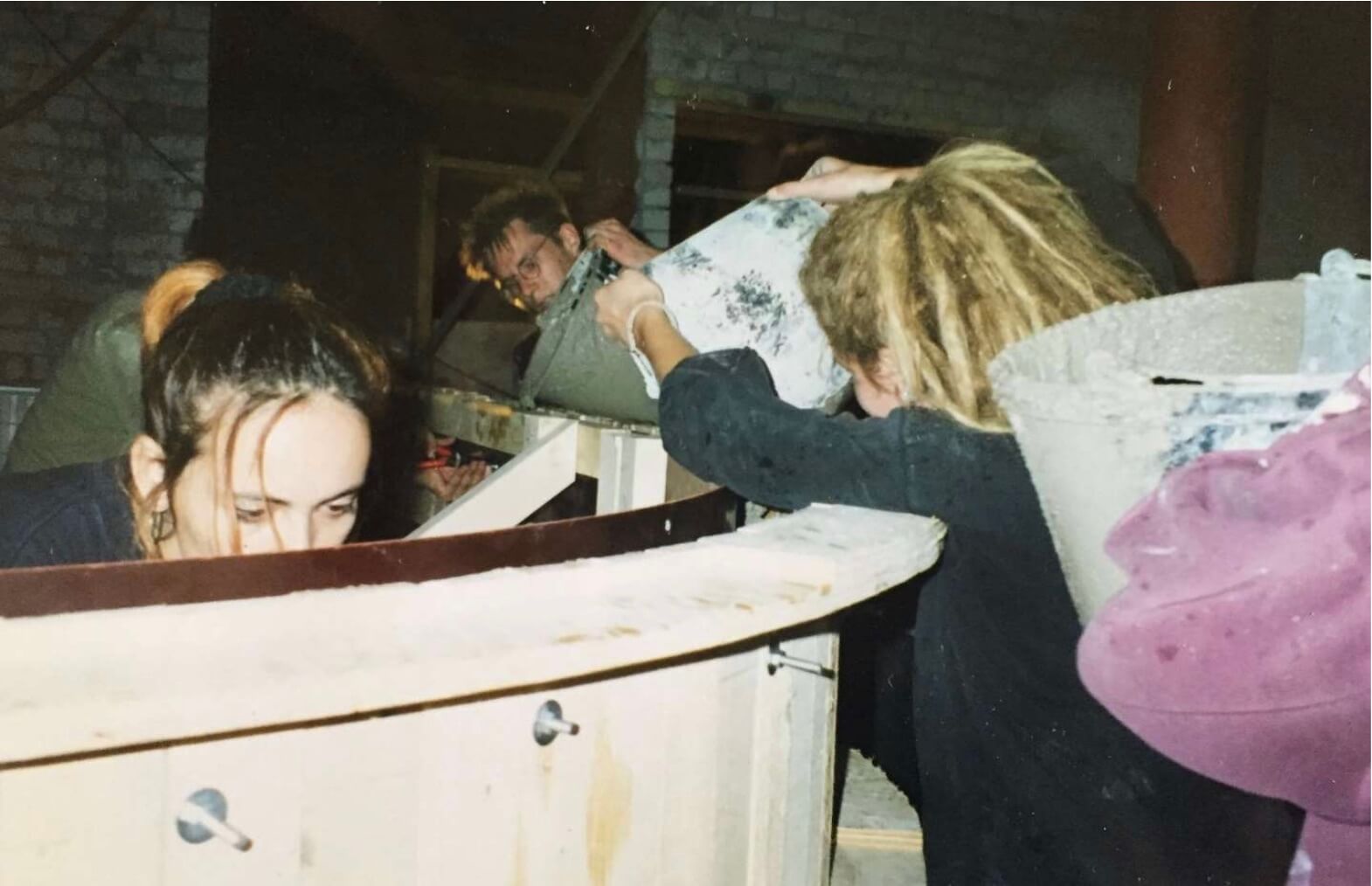
Renovations inside the bar, sometime in the late 1990’s
1990’s – Part 4
So, there were renovations. And how! The ACU building and the Boothstraat building were renovated at the same time by a large group of volunteers and in collaboration with a contractor.
The renovation started with demolishing. Not much is left of the original lay-out of the ACU building. The old kitchen was taken out, inner and outer walls were taken down, ceilings demolished, supporting beams changed, foundations adjusted.
The old entrance to the bar (which used to be at the side of the building) was covered up, the facade was changed, the roofing renewed and there were kilometers of masonry and plastering.
Where the old kitchen used to be a new addition was built for offices, backstage and toilets.
And not only the ground floor has changed, also the first and second floor were renovated so that they could be used as offices and apartments.
-
1997 – 2004
In ACU’s post-squat era, the organizational structure has seen some changes. In the first period major decisions were still made by a small “team,” a structure carried over from the squat years.
In this time ACU also had a group of initially 4 and later 8 persons who received a small financial compensation, which subsidized by government money (“Melkerbanen”) until this program was discontinued in 2004.
-
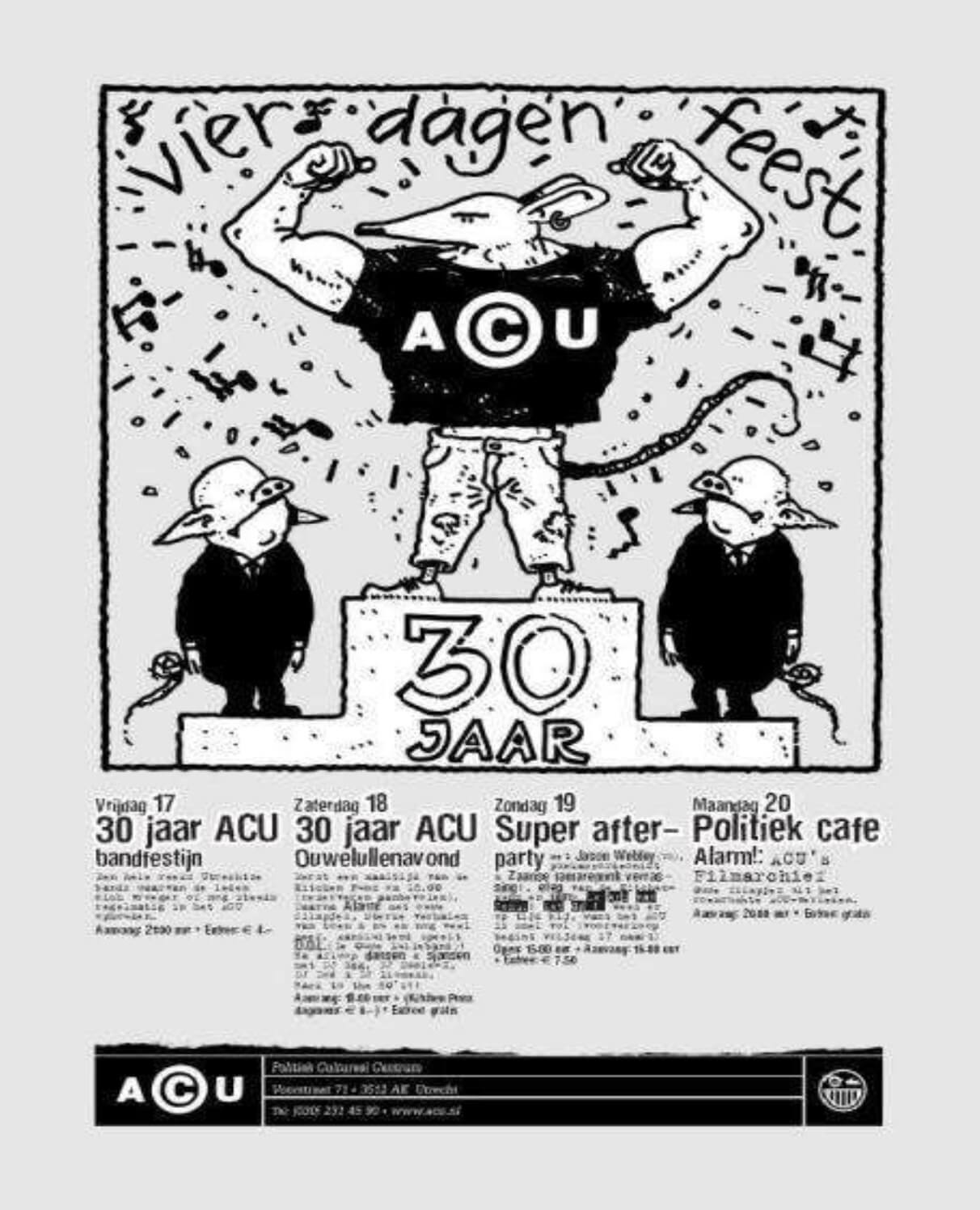
Poster for ‘30 years ACU’, 2006
2004 – 2019
Since 2004 ACU is ran entirely on a volunteer basis, with main decisions being made by collective as whole during the monthly meeting where all volunteers are welcome.
In terms of nightlife, ACU has developed as one of the most vibrant places of its kind: certainly less punk and gritty than in the 90s, more open and also increasingly international and queer.
The concerts and parties have been many: For a while there was the Cocktail Bar from Hell with stiff drinks poured in the venue. On Friday nights, there is the tradition of Vitamine Disco, and on Thursday and Saturday there has been programming by guest groups.
The list is long and incomplete:
- Kitty (a lesbian night)
- Cruise Control (ACU’s longest still running (queer) party)
- Underground/Area51/The Hatch
- Dead Beat Society
- Kako da Ne
- Manifest
- The Lick
- Out of Sight
- Mass Productions
- Swing-a-Ling
- Meet me in Jamaica
- ACU Classics
- Unheard Sounds
- Broccoli Disco
- …
Once, to balance things out, there also were yoga Wednesdays.
-
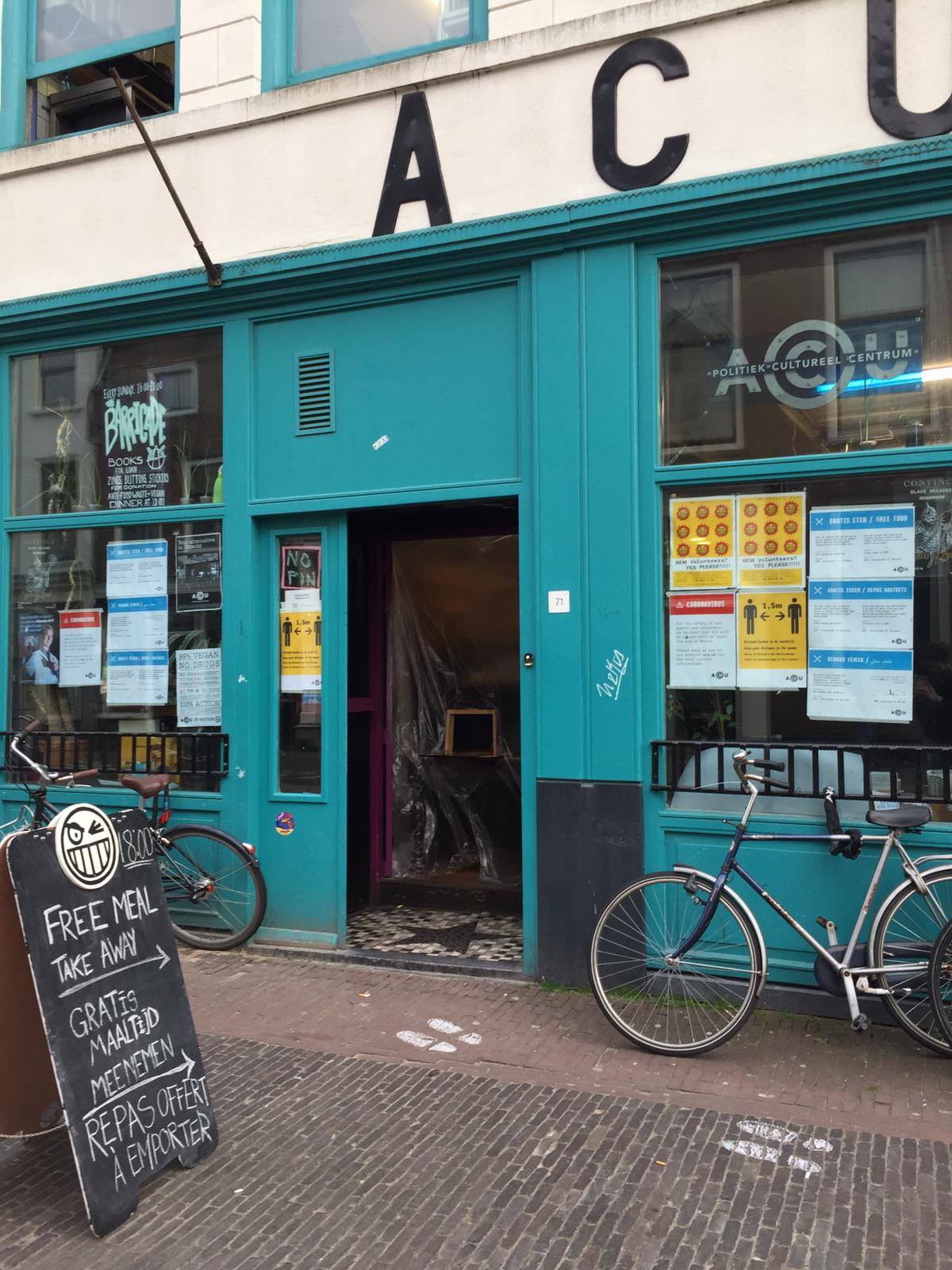
Solidarity Kitchen, 2020
2020
And then, the whole world had a collective problem: COVID-19.
It is the first time ever, since the squatting in 1976, ACU has been closed to the public for such a long time.
But that doesnt’t mean the volunteers at ACU were just sitting around on their asses!
Already in the first few days of the ‘intelligent lockdown’, the project ‘Solidarity Kitchen’ has been set-up to give food to the homeless and the needy. Every night, around 100 meals were given out to those in need, through a safe transparent screen (made from a shower curtain).
The parties also went on, only they were moved to an online environment with the use of streaming technology, so you can dance at home. That’s right, we pulled an UNO-reverse card on ya!
But seriously, in this way, instead of feeling home in ACU, you can feel ACU in your own home.
-
2022
Now that the world has gradually transitioned to a post-COVID new normal, ACU has reopened its doors and is alive and buzzing again. Check out our regularly updated calendar to know what’s on!
-
The future...
Opening hours
ACU = CASH PLEASE
Hit the ATM in time, because we prefer cash payments.

Volunteers wanted!
As you have read, ACU is run completely by volunteers. Everything from bar to bookings is done by volunteers.
Over four decades of DIY spirit persists and ACU still continues to create alternatives. Be part of it!
Do you want to help us out? Sign up via the button below and we’ll invite you to our new volunteers introduction!